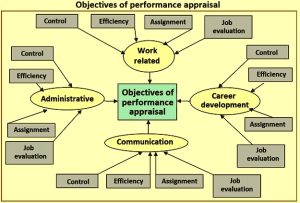
Key Objectives and Types of Performance Appraisal
Performance appraisal — one of the most exciting words for employees, but often a complicated process for companies (just kidding). Whether your organisation has one employee or a thousand, recognising and appreciating their hard work not only boosts morale but also drives motivation, loyalty, and productivity across the board.
But here, true performance assessments or appraisals are different insights, and that takes something deeper and more frequent to understand.
Think of performance appraisal as employee health checkups. They help managers assess what’s going well, what’s not, and how to get employees working in tandem with company objectives. A performance appraisal should not be a one-time event or a box-checking exercise like deciding who the company will reward with a pay raise. A good appraisal should create a sense of enthusiasm, take advantage of retention opportunities, and discover workers’ potential.
This blog will highlight the primary objectives of performance appraisals, as well as the different forms of performance appraisals that organisations use to develop a balanced and flourishing work culture. Whether you are an HR professional or a team lead, this blog will help you find the answer to your objectives of performance appraisal that you may be looking for. Read on!
Table Of Content
What is a Performance Appraisal?
Key Objectives of Performance Appraisals
8 Common Types of Performance Appraisals
Wrapping Up
Frequently Asked Questions
What is a Performance Appraisal?
Performance appraisal is the process of formally evaluating an employee’s performance over a time period. Performance appraisal typically will involve comparing performance against established goals, collecting feedback from various parties, and discussing strengths, weaknesses, and development opportunities with the employee.
At its core, though, performance appraisal is all about communication. It is an opportunity for employees and managers to have a conversation; to discuss performance, employee expectations, growth, and understanding. A performance appraisal process – annual, quarterly or even monthly – can help to establish clarity and alignment across your team if managed well.

Key Objectives of Performance Appraisals
8 Common Types of Performance Appraisals
Wrapping Up
Performance appraisals are so much more than filling out forms or having an uncomfortable meeting once a year. In fact, when done properly, performance appraisals are perhaps one of the most powerful tools in any organisation looking to drive growth, retain talent and create an open and honest culture to work within.
By exploring the major aim of performance appraisals and making the right choice from available performance appraisal methods, you can turn performance appraisals into a key resource when it comes to competing on more than simply price.
So whether you’re managing a small team or a department, get value from performance appraisals—and enjoy the rewards for yourself, your people, and your business. If you want to learn more about performance appraisal and how to be a great leader, explore online courses available at Jaro Education, India’s leading online higher education and upskilling company.
Most organisations use a five-point rating scale to meet the objectives of performance appraisal:
- Outstanding / Exceeds Expectations
- Above Expectations / Very Good
- Meets Expectations / Good
- Needs Improvement / Developing
- Unsatisfactory / Does Not Meet Expectations


